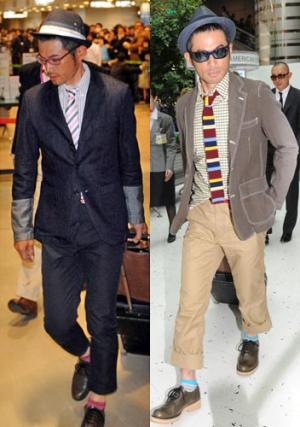 | |
| Ichiro at Narita (from Nikkan Sports News) |
The village of Kanoya, on the other hand, was a typical farming community where young people left for urban areas, and the biggest population was retirement age folks. It seemed like a community that would one day in near future become extinct.
A leader of the community who had no way to stop the departing young people one day suggested, "Hey, why don't you go and see Ichiro by earning some money and making the trip to Tokyo?" The kids started farming sweet potatoes. A land which no longer had people to farm was donated for the purpose. Since kids no longer worked in the fields, they didn't know how to grow sweet potatoes. Both active farmers and retired citizens helped the kids.
They made some profit from the sweet potatoes -- it was enough to get the kids to Fukuoka Dome stadium in Fukuoka, which is in the biggest city in the Kyushu island, instead of Tokyo Dome. The Ichiro mission of those kids was completed; it also presented a shining opportunity to the community. They saw they could do something to possibly revitalize the community and prevent a loss of residents. They tried different original products. The entire community participated in this mission.
Kagoshima is the capital of Shochu (claiming "a capital" since other places claim it too), one of Japanese' favorite alcohol -- it is a distilled spirit made from rice, wheat, buck wheat, potatoes, etc. It is well known that Shochu from Kagoshima is made from sweet potatoes. The community of Yanagitani started producing Shochu from the sweet potatoes. It was originally grown for starch in the Ichiro mission. The brand name is Yanedan (the picture in the left). They gradually added other locally made products. Their touching attitude and modest locally made products won a few different community competitions. They divided the profit of the Shochu among the community members since all worked for that. The community was talked about in news and TV shows as "a village which pays a bonus".
Take a look. I want to show you the community and the products but this is the best image I could find on the Internet. I could hardly surf around in their text-only oriented blog style website. You probably can tell how commercial they are. Their site is www.yanedan.com.
One of their original products is organic compost from their livestock. Their local bacteria does something to it and it reduces the odder. It grows their organic vegetables and is used for other purposes too. Municipal governments from all over in Japan now come to learn now this industrious little community made such an ideal revival. They offer empty houses and buildings for artists to move in. Artists sell their art in the community store; young people once left the community returned, invited several families of the tsunami last year.
The area of Kagoshima has no railroad. This made the area isolated from contemporary conveniences therefore young people left. But the trend is changing. People pay extra for getting safe food and non-industrial commodities. Human nature fought back and it made the community one of the pretty getaways in Kyushu and elsewhere. Visitors enjoy browsing around the new artist workshops, and buying organic veggies, water and Shochu. I think (sorry, not many information available) it is not the business they run but in a near-by public bathing facility; their water is heated by burning trash. The water is mineral spring but the temperature isn't high enough so the trash burning heat is used. This way of using the same source for heating both the bath and swimming pool is pretty common in Japan. It is not their original idea at all but it fits their organic and community-oriented concept.
Here are their cornerstone ideas, called the Ten Articles of Creation School:
- Laugh during hard times.
- Always discover human treasures (human resources).
- Respect everyone's opinion.
- Pass and teach information to others.
- Don't do it by yourself. Do it with 100 people.
- Adopt the viewpoint of children and the wisdom of the old.
- Support the successes of leaders who will lead the next generation.
- Move other people by tears and sweat.
- Put soul into each word.
- Recharge the community with your own strength.
As a big sports fan, I say it's a beauty of heroes. They move fans by working hard and doing what they are good at. Without a baseball hero like Ichiro, the first step might have never been taken. It's another good job on Ichiro's part, though he probably he doesn't know about this. Even non-sports fans know and can applause. The regular outfit of him like the above photos by the way, although it makes news in Japan every time he returns, uhh... well... no comment.



